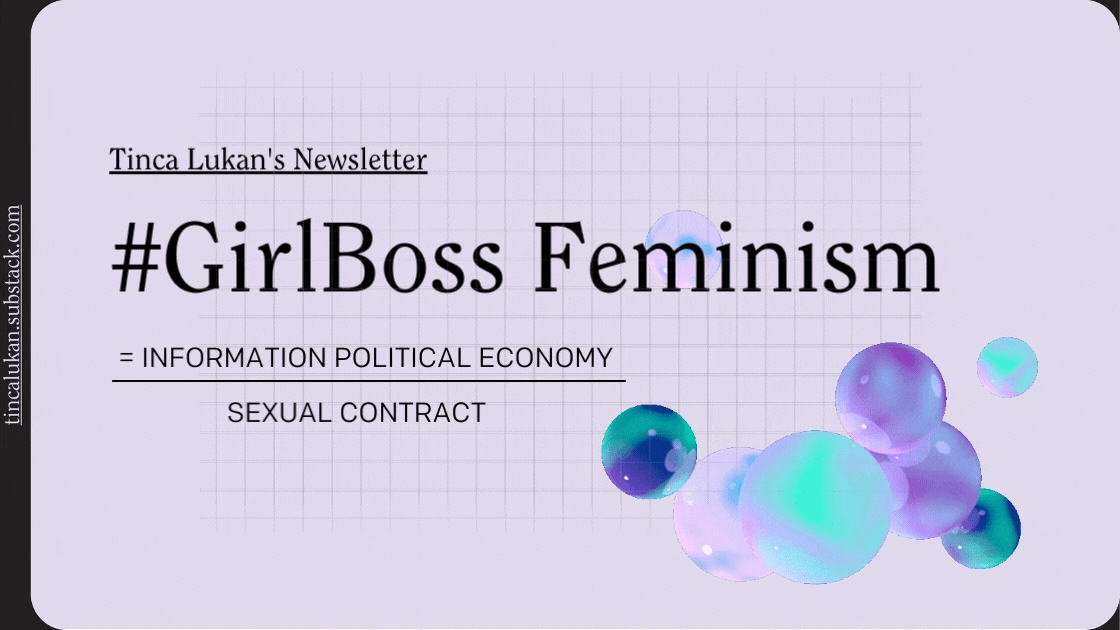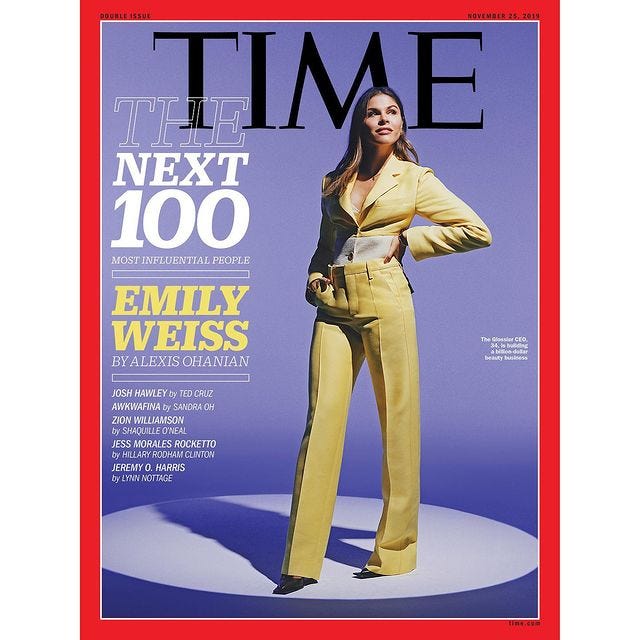On #Girlboss Feminism
Girl boss is a new sexual contract offered to women by the information political economy
In this post, I propose an argument that Girl boss epitomizes a new feminist subject and the sexual contract offered to women by the new, information political economy. I highly recommend playing this song as a background while reading this. 🧚🏻♀️
#Girlboss
The term girl boss marked the last decade. Sophia Amoruso coined it as the title of her business memoir. The term trickled down into common parlance depicting female founders like Emily Weiss, Leandra Medine, and Whitney Wolfe Herd.
On TikTok, we often hear the term girl boss as a verb, i.e., girlbossing, to describe hardworking and driven young women. In this post, I aim to answer the question, “How can we understand a girl boss?”
Theoretically, I will be drawing on Angela McRobbie and her book The Aftermath of Feminism, where she claims that back in the 1990s, neoliberalism offered women a post-feminist sexual contract.
Post-feminist sexual contract
According to McRobbie, neoliberalism, a political and economic doctrine, offered women a new sexual contract, i.e. new idea(l)s about what is acceptable and desired for women.
The contract was offered to women by four figures of feminine agency:
Postfeminist masquerade: The increasing number of women entering the labor market challenged the dominant position of men in the society. To “unchallenge” men, women were encouraged to put on a “mask,” or what McRobbie calls postfeminist masquerade. An example of a postfeminist masquerade is Bridget Jones. She participates in the labor market as an independent woman, yet, she wears a mask of naivety and irony, wants a man, and is afraid of ending up alone. Thus, she affirms the central status of men (in her life).
Working girl: Women at that time were encouraged to become wage-earning citizen, build a career and spend money in the fashion-beauty industry. Recall the character of Elle Woods in Legally Blonde.
Phallic girl: For the first time in the history, women were allowed to have free sex, drink alcohol and enjoy the city (like their male counterparts) as long as they are economically independent and do not become single-mothers depending on a state welfare. Remember Geri Halliwell from Spice Girls?
Global girl: The last figure is a global girl, with women from the third world being invited into the global femininity and to consume western culture. Remember the famous Benetton advertising campaigns that portray the “all different, all equal” ethos?
End of Neoliberalism and the Rise of Information Political Economy
In the last years, many authors claim that neoliberal capitalism, characterized by austerity, market deregulation, and shrinking of the welfare state, has ended. McKenzie Wark claims that “Capital is dead” and proposes that we are in an information political economy based on data extraction.
Information political economy brought new class relations composed of the vectorialist and hacker class. The former owns and controls vectors of information, patents, intellectual property, and celebrities that galvanize attention. The latter produces new information. In what follows, my aim is to show that this new information political economy offers women a new sexual contract, that is not post-feminist anymore. I call it girlboss sexual contract.
Girlboss sexual contract
Girlboss sexual contract offered itself to women through four new female agency figures: girl boss masquerade, boss babe, power couples, and woke girl.
Post-feminist masquerade is replaced with girl boss masquerade where women are confident, instead of naive, and empowered instead of not used to power. Confidence and empowerment of women challenge the patriarchy. However, they “unchallenge” it by constant positivity and “leaning in”.
Boss babe replaced the working girl. Women within the information political economy are not encouraged to enter the labor market and find employment. They are encouraged to become a boss, run their own business, love their work, and operate not only in the field of consumption but also in the field of production.
The phallic girl who enjoys free sex and drinks alcohol was replaced with power couples. The ideal for women becomes a monogamous heterosexual relationship. Ideally, women start their businesses and ventures together with their male partners as #powercouples. This constant hustling allows no drinking and smoking but self-care and the ideal of sobriety which James Rushing calls “dry capitalism”.
Lastly, woke girl replaced the global girl as a celebration of globalization. Woke girl is aware of uneven globalization and power imbalances. Women today are woke and activist. They have to be, as the current times are marked with call-out-culture. Hence, they offer entrepreneurship or confidence mentorships for women from marginalized groups.
Is it a generational thing?
To conclude, girl boss is a new feminist subject in the information political economy. She is part of the hacker class. She is empowered, positive, and loves her work. Because in the information political economy, the only desire permissible is to become a boss. Girlboss became prominent after 2008 for unemployed, precarious millennial generation women as the information political economy filled the void of lack of jobs in the post-2008 recession. Hence, it could be, to some extent, a generational phenomenon.
From my Filter Bubble:
Article in The Atlantic: The End of the Asset Economy:
“The problem with our asset age is not that so much wealth has been generated. It is that so much wealth has been generated for so few. If everyone could own some Facebook stock and a house in Palo Alto, everyone would be better off, even in a down market.”
IG post by New Yorker cartoons (it’s hilarious, I promise). Are you Nancy Pelosi now?
(In Slo): Podcast episode with Blaž Kosovel, author of the book Zakaj Amerika nima ministrstva za kulturo:
Some nerdy sociological memes on Max Weber on Twitter:
Article by the excellent Brooke Erin Duffy in the Salon titled: Influencer Culture is everywhere - even in academia.
“It's easy to blame glib narcissism for a marketing-orientation that has configured nearly every professional domain (yes, even religion). And there are no doubt individuals seduced by the glittering promise of social media fame. Naive exuberance may distract them from the rigged nature of the creator economy, including staggering social inequity. But more often, the charge to social media promotionalism is imposed upon us and appears, to many, to be the best worst option for exposure, opportunity, and meaningful engagement.”















